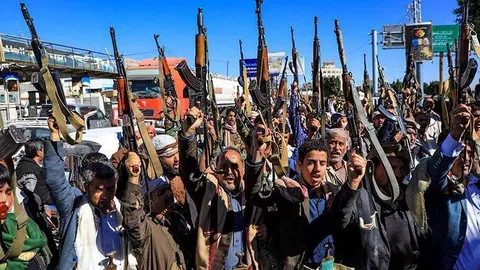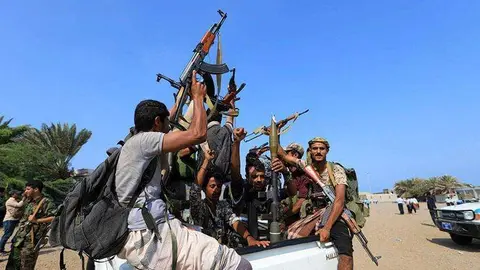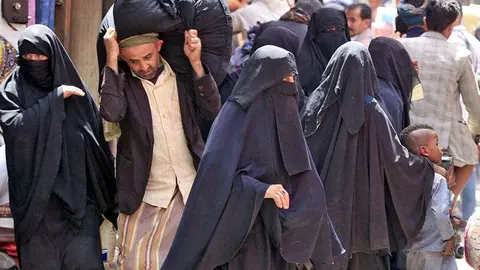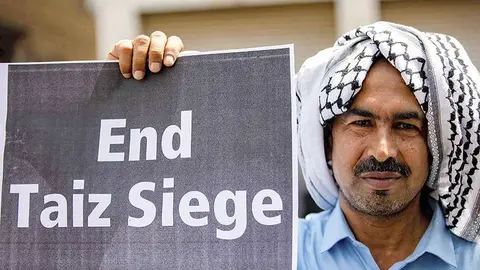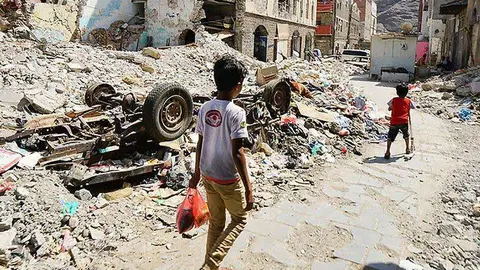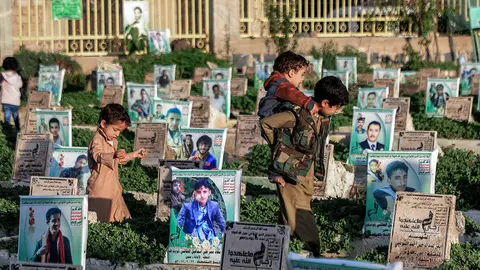Who are the Houthis in Yemen and who finances them?
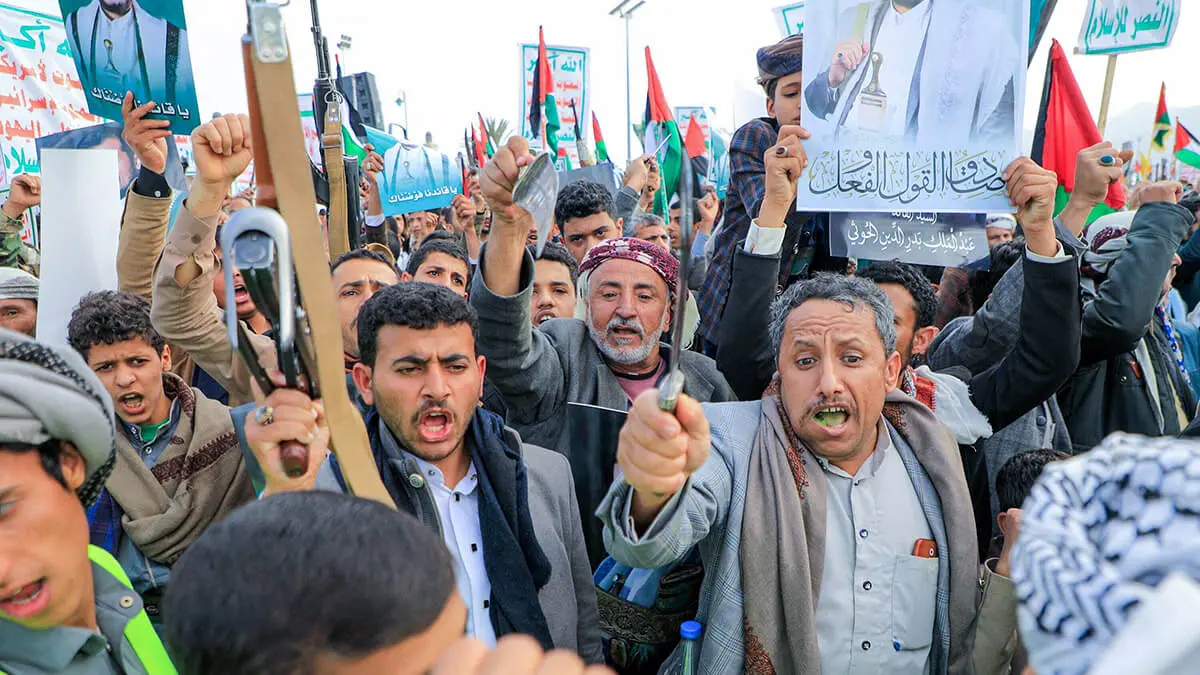
The Houthis have come into the international spotlight in recent months due to their attacks on commercial ships transiting the Red Sea, one of the world's most important strategic points for global trade.
- Origins and aims of the Houthis
- Coming to power and the start of the war
- Houthi abuses against Yemeni civilians
- Armament and financing
- US and UK strike Houthi positions in Yemen
- Saudi Arabia calls for restraint; Israel on "high alert"
Furthermore, since the beginning of the war between Israel and Hamas following the terrorist group's attack, the Houthis have launched several attacks against Israeli territory, specifically against the Red Sea city of Eilat.
However, although the Houthis' destabilising actions in recent months have put them in the international spotlight, the rebel group has been engaged in a bloody civil war for years and has been terrorising Yemenis themselves.
The war in Gaza, as well as recent US and UK attacks on their positions in Yemen, have made part of the international community aware of the threat posed by the Houthis through their destabilising actions. However, Yemeni civilians, as well as neighbouring countries, have been aware of this for many years.

Origins and aims of the Houthis
The Houthi movement, which is part of the Zaidi branch of Shia Islam, emerged in northern Yemen in the 1990s in opposition to the growing religious and financial influence of Saudi Arabia.
The Kingdom is, in fact, one of the main enemies of the Houthis, who have even launched attacks on Saudi territory in recent years. They have also targeted the United Arab Emirates, which is part of the international coalition against the Houthis.

This militia, known as Ansar Allah (Supporters of God), was also born with the intention of fighting the then Yemeni president, Ali Abdullah Saleh, an ally of Riyadh. Likewise, since its inception and through its slogan - "God is great, death to America, death to Israel, curse the Jews and victory for Islam" - the Houthis have made their ideology and goals clear.
The Houthis have declared themselves part of the so-called 'Axis of Resistance', led by the Islamic Republic of Iran. This alliance - which also includes other Tehran-backed organisations such as Hamas, Hezbollah and pro-Iranian militias in Syria and Iraq - is a staunch enemy of Israel, the US and the West in general.
Coming to power and the start of the war
After several clashes between the Houthis and the Saudi-backed Saleh government over the years, in 2011 - and in the context of the Arab Spring - the Houthis and their supporters began to clash violently with national security forces. The Yemeni government accused Iran of supporting these revolts, which even led President Saleh to cede power to his right-hand man, Abd Rabbuh Mansour al-Hadi.
However, Hadi failed to gain much popularity in Yemen, as the Houthis continued to gain followers and consolidate their territorial control, advancing towards Sana'a, where they arrived in 2014.
The Houthis seized the presidential palace and forced President Hadi to resign and flee south to Aden, where he declared himself Yemen's legitimate president. In response, the Houthis began bombing the southern city, sparking the civil war that has lasted to this day.

For his part, Hadi called on Saudi Arabia and a coalition of other countries to attack Houthi positions. Meanwhile, the civil conflict intensified and a humanitarian crisis began that has been considered the worst on the planet.
Today, after much bloody fighting, the Houthis control most of the west of the country - including the capital, Sana'a - and are also in charge of the strategic Red Sea coast.
In 2022 the United Nations put the number of people killed during the war in Yemen at 377,000, also highlighting the plight of four million displaced people. Years later, the situation is far from improving. According to UN data, 21.6 million people needed some form of humanitarian assistance in 2023, while 80 per cent of the country struggles to find food and access basic services.
"Violence against women and girls, already high before the conflict, has worsened, and displaced women and girls, female-headed households and persons with disabilities are particularly at risk," the UN stresses.
Houthi abuses against Yemeni civilians
In the midst of this grave picture, there is also the brutality and systematic human rights violations committed by the Houthis against the Yemeni civilian population. Already in 2016, a Human Rights Watch report denounced that the Houthis had arbitrarily detained and tortured numerous opponents shortly after coming to power.
This inhumane behaviour against civilians has continued, and the Houthis have even been accused by the UN and media outlets such as CNN of stealing humanitarian aid reaching the areas they control.
While the UN found that 1% of aid was disappearing, a CNN undercover investigation on the ground found that many families are not receiving aid, despite arriving in the country.
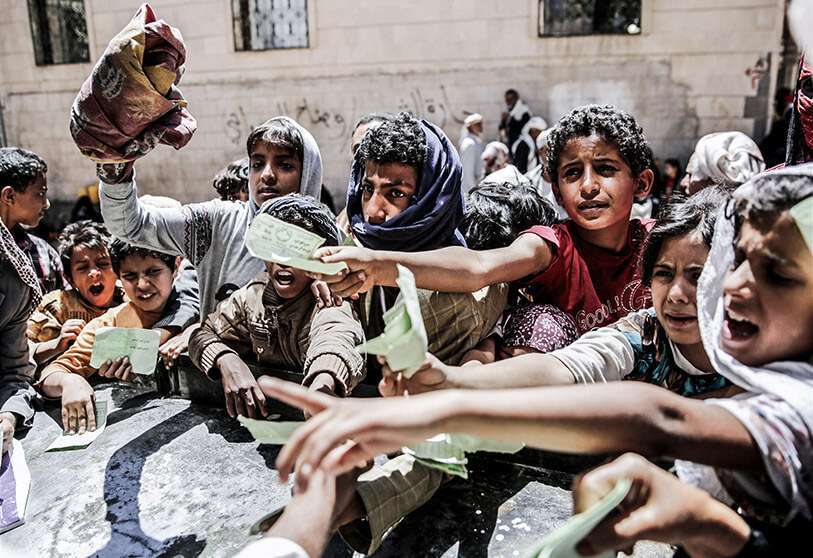
In addition to stealing aid, the Houthis have been accused by various human rights organisations of war crimes and crimes against humanity, as well as of isolating large cities, causing humanitarian and food crises, as has happened in Taiz, which has been besieged since 2015.
In this regard, as in all wars, women and girls bear the brunt. The Houthis have imprisoned thousands of women, who have been tortured, raped and killed in prison. On the other hand, the Houthis obstruct access to education for girls, just as the Taliban do in Afghanistan or fundamentalist groups such as Boko Haram do in parts of Africa.
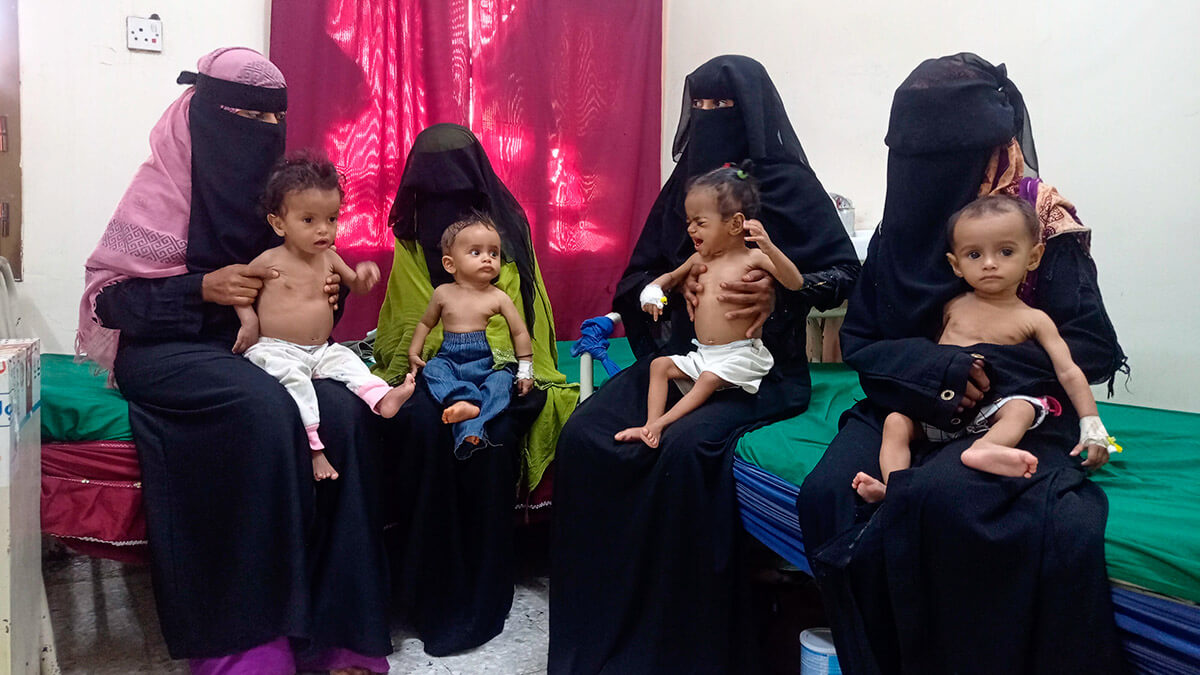
According to HRW, the Huthis have increasingly restricted the freedoms of women and girls since taking over Sana'a in 2014. The NGO speaks of "systematic violations of women's and girls' rights" by the group, including their rights to freedom of movement, freedom of expression, health and work, as well as widespread discrimination.
While oppressing girls, boys are forcibly recruited and sent to training camps, promoting their extremist ideology.
Religious minorities - such as Christians, Jews and Baha'is - are also persecuted and oppressed by the Houthi militias.
Armament and financing
According to UN Security Council data, in 2010 the Houthis had between 100,000 and 120,000 supporters. These numbers include both armed troops and civilian supporters. Today they are estimated to number around 20,000 fighters, as The Guardian reports.
But what is really remarkable about the Houthis is the increase in their military capabilities in recent years, despite the war. The Houthis have managed to reach targets between 900 and 1,300 kilometres away, such as several locations in Saudi Arabia - including Riyadh - and the Emirati capital Abu Dhabi.

Sana'a has warned that the missiles and drones that have already reached Saudi and Emirati territory will also reach the Israeli cities of Tel Aviv and Eilat. The latter has been the target of several Houthi attacks, although air defences have been able to repel them.
Some of these weapons were presented at a military parade to mark the ninth anniversary of the coup on 21 September 2023. As The Middle East Institute's Ibrahim Jalal lists, the new weaponry on display was as follows:
- Typhoon or Toufan long-range ballistic missiles with a range of 1,350-1,900 km reminiscent of Iran's Ghadr ballistic missiles.
- Quds-4 and Quds Z-0 land-attack cruise missiles that can engage land and naval targets.
- Asef and Falaq sea-denial systems, with a range of 200 km and 300 km respectively, similar to Iran's Khalij-e Fars anti-ship missiles.
The Houthis also displayed previously known weapons:
- Samad 2/3/4 drones, reminiscent of Iran's Shahed drones, with a range of 1,200 km-1,500 km, 1,300 km-1,700 km and 2,000 km, respectively.
- Wa'id drones, similar to Iran's Shahed 136, with a range of 2,500 km.
- Quds-2 cruise missiles, similar to Iran's Soumar, with a range of up to 1,350 km.
- Burkan-2H/3 missiles, reminiscent of Iran's Qiam, with a reported range of 1,000 km and 1,200 km respectively.
As can be seen, Iran is very present in the Houthis' military capabilities, as the Islamic Republic has always been identified as the main financier of the Yemeni rebel group.

Tehran has publicly supported the Houthis, even comparing their cause to that of Hezbollah. Indeed, the Lebanese Shia group - also backed by Iran - has provided extensive military training and expertise to the Houthis since 2024, according to the US-based Combating Terrorism Center research institute.
Saudi Arabia, the US and the West in general have accused the Iranian regime of financing and sending weapons to the Houthis, although Tehran has denied this. In this sense, the close relationship between the Houthis and Iran has further alienated Tehran and Riyadh, bitter enemies despite the recent rapprochement driven by China. The Kingdom has blamed the Iranians for supplying weapons that the Houthis subsequently used to attack Saudi territory.
Similarly, in the wake of recent events in the Red Sea, Washington has claimed that Iran is "deeply" involved in Houthi attacks on commercial vessels.
In addition to Iran, the Houthis have other sources of support. According to the US think tank Woodrow Wilson International Center for Scholars, the rebels have received funding from local supporters and charitable organisations, as well as from illegal trade.
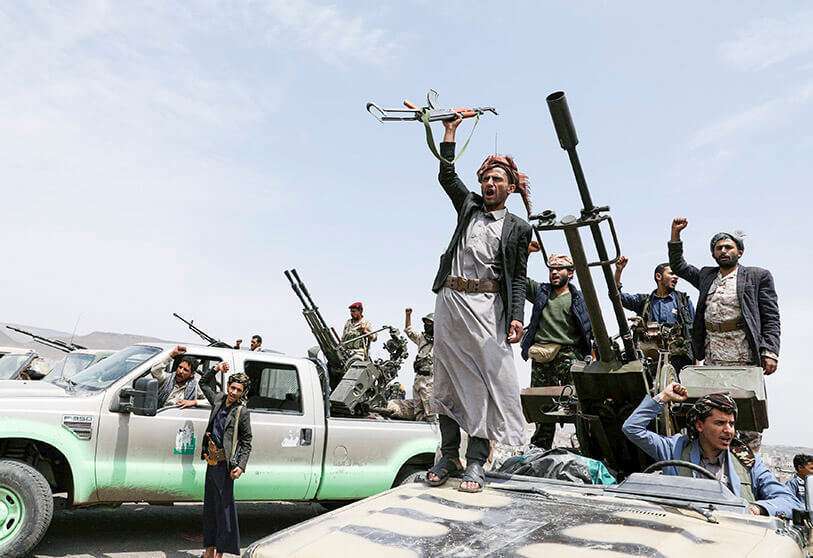
US and UK strike Houthi positions in Yemen
Yemeni rebels have been threatening commercial vessels transiting the Red Sea for months, endangering international trade. After numerous attacks, the US and the UK - supported by Australia, Bahrain, Canada and the Netherlands - have responded to the Houthis' actions by bombing their positions in Yemen for the first time.
The targets of the strikes - which used Tomahawk missiles - were an air base, airports and a military camp, according to the pro-Huthi media outlet Al-Masirah. The US and British bombings have also left five fighters dead, as well as six wounded.
Likely legit video from Yemen. Violent explosions. pic.twitter.com/LIk0pYNPlW
— Moshe Schwartz (@YWNReporter) January 12, 2024
"Our country was subjected to a massive aggressive attack by American and British ships, submarines and fighter jets," denounced Houthi Deputy Foreign Minister Hussein Al-Ezzi, who warned that Washington and London would have to "prepare to pay a heavy price and bear all the terrible consequences of this blatant aggression".
A Houthi military spokesman, General Yahya Saree, also vowed that US and British actions "will not go unanswered and unpunished".
Hezbollah and Hamas have condemned the attacks, while Iran has called them a "clear violation of Yemen's sovereignty and territorial integrity, and a violation of international laws, regulations and rights".
Massive mass demonstrations in Saada, Yemen after US & UK strikes on Houthi targets. pic.twitter.com/vVzlc2EAYp
— Clash Report (@clashreport) January 12, 2024
US President Joe Biden has described them as a "defensive action" after the Red Sea attacks, saying he "will not hesitate" to order further military action if necessary.
British Prime Minister Rishi Sunak has made a similar statement, saying the attacks were "necessary and proportionate".
According to CNN, the USS Florida submarine - one of four nuclear-powered guided missile submarines in the US Navy's fleet - guided missile destroyers and UK Typhoon fighters were used in the attack.
Footage from the UK @DefenceHQ of last night's strikes on the #Houthis in #Yemen. #IRGCterrorists pic.twitter.com/ikehEhFdAu
— Jason Brodsky (@JasonMBrodsky) January 12, 2024
Saudi Arabia calls for restraint; Israel on "high alert"
The United States' major ally in the region, Saudi Arabia - an enemy of the Houthis - has called for "restraint" in order to avoid escalation. "The Kingdom of Saudi Arabia is following the military operations with great concern," a foreign ministry statement said.
Israel, Washington and the West's other major partner in the Middle East, was informed in advance of the attacks, Axios revealed. Israel is also on "high alert" for any response from the Houthis and other pro-Iranian militias in the region, according to Axios.

